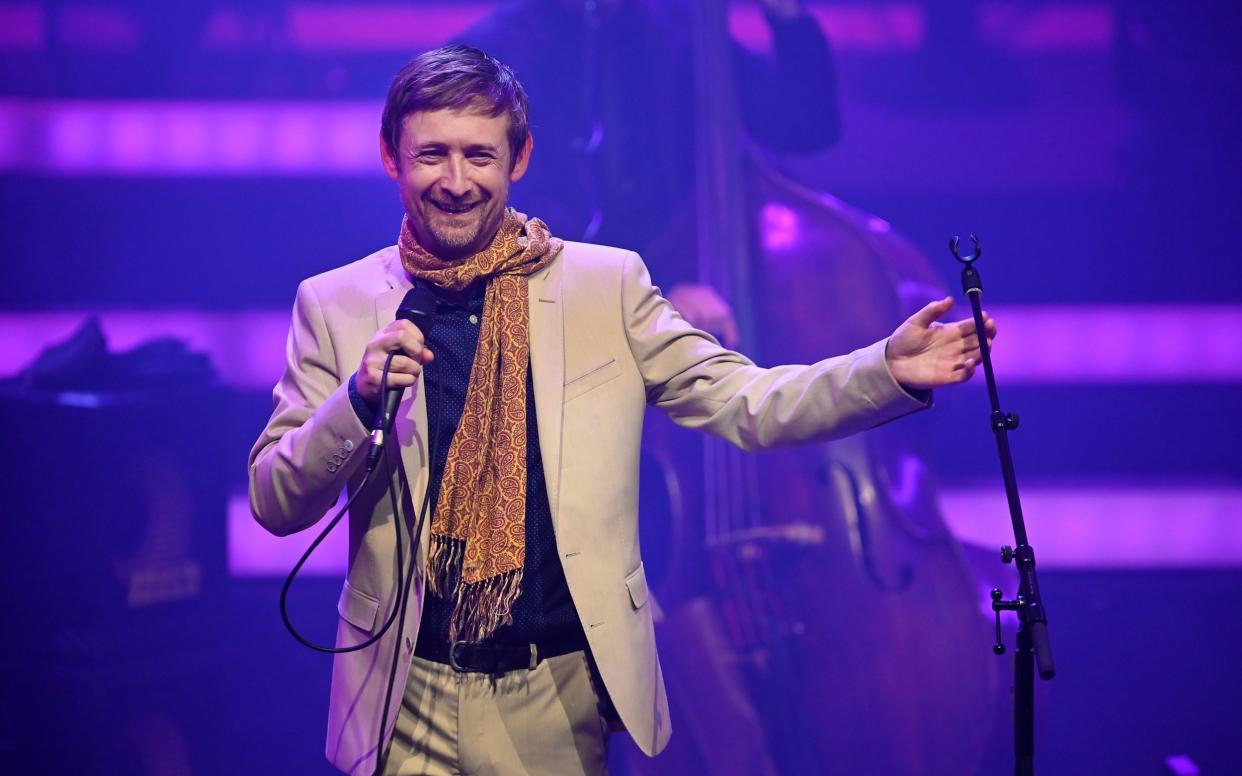The Divine Comedy review, Barbican: a frontman having an infectiously good time

“Welcome to the first date of our tour. And the last,” announced Neil Hannon. Live concerts being something of a rarity at the moment, the Northern Irish singer-songwriter appeared understandably nervous leading his band, The Divine Comedy, out onto the stage of a very empty Barbican for their only gig of the year.
This was originally planned as a series of five concerts covering 10 albums in their entirety (two a night), from across the span of Hannon’s 30-year-career. In the event, it was boiled down to a single hour-long show, performed in front of just 300 people spread around a 2,000-capacity hall, while simultaneously being streamed to paying fans at home. Nevertheless, Hannon was determined to make the most of it. “Hey, it’s a gig!” he proclaimed incredulously. “This is the only time I get to do this, so I’m going to enjoy myself, if that’s all right?”
Well, it’s all right by me. As a critic in the strange times, it can be hard to decide whether you are reviewing the space or the performance. Social distancing plays havoc with the essential dynamics of audience interaction. I have to say the Barbican seemed awfully deserted, with only a handful of seats occupied in every second row. Even the six-piece band appeared to be keeping their distance from each other on the vast, empty stage.
In this inevitably tepid atmosphere, Hannon seemed at first like a slightly desperate cheerleader trying to get a party started at an agoraphobia convention. During Something For The Weekend, he was thrashing his acoustic guitar with such vigour that he cried out “Oh God! I’m exhausted!” during the lengthy coda. “I’m not match fit,” he gasped at the song’s conclusion.
In a way, there has always been something socially distanced about The Divine Comedy’s arch and cerebral songcraft. There is a clue right there in a band name plucked from Dante that Hannon was never on a path to unabashed populism. His music aspires to the giddy flow and expanse of Stephen Sondheim, shot through with the refined language and English parlour wit of No?l Coward. Even at the height of their success in the Nineties, Hannon presented himself almost as a foppish foil to the more laddish instincts of Britpop.

The National Express, their biggest hit single, might just be a jolly singalong ditty about a coach trip, yet lurking between the lines is a sly satire of parochial nationalism. Hannon’s songs repay close attention, and that is what this concert allowed, with the sound full and wide, the lyrics crisp and clear. There is comedy, for sure, in songs such as To Die a Virgin (dedicated “to all the students trapped in lockdown”) but Hannon’s strongest suit may be the pathos he brings to wry character studies such as A Lady of a Certain Age, or the delicate emotions by his most tender and sincere love song, To The Rescue.
When your band includes an accordionist, a concert pianist and a double bass player, the aspiration is unlikely to be to blow audiences away with rock and roll vigour, rather to draw them in and make them part of your world. Hannon introduced Charmed Life (from 2004) as a song he wrote for his infant daughter, then added “She’s going to university this year. That makes me feel a little ancient.”
Hannon was something of a prodigy when he first arrived on the music scene at just 19 years old, and yet, if anything, at 49 he has grown into his slightly antiquated persona. His obvious pleasure at being back on stage, performing, was touching and engaging. As the band lined up at the front of the stage to take a socially distanced bow, Hannon sighed “that was good for the soul”. A standing ovation from the small audience suggested everyone present felt the same.
